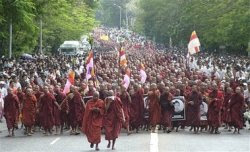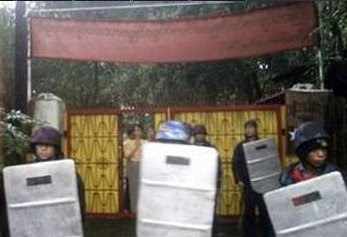Agam's Gecko


Tuesday, September 25, 2007
BURMA: RANGOON MARCHERS REACH 130,000 - JUNTA ISSUES WARNING
| P |
eaceful demonstrations across Burma intensified significantly today, with more than 130,000 Buddhist monks and democracy supporters taking to Rangoon's rain-soaked streets. Only two days earlier, the largest demonstration had been in Mandalay, where an estimated 10,000 turned out on Saturday. Following the monks' call for citizen participation, more than 20,000 took the freedom walk in Rangoon on Sunday. The democracy movement's astounding surge today shows a Burmese citizenry ready to go the distance, until the hated regime is no more.
Two large marches made their way through the former capital today, while the ruling clique huddled in their remote new capital Naypyidaw, wondering what to do next. Rumours abound that a violent crackdown is coming, that hospitals are being emptied in preparation for mass casualties -- yet Aung San Suu Kyi's teaching on "freedom from fear" seems to be holding strong among the people. The monks have asked the marchers to chant Buddhist prayers and to refrain from using political slogans.
One march began today at Shwedagon Pagoda and moved past the offices of Suu Kyi's National League for Democracy, which won more than 80% of parliamentary seats in a fair election in 1990. The parliament has never been allowed to meet, and its leader has spent most of the time since under house arrest.
NLD officials came out, clasped their hands and bowed in respect, and then joined in.The Generals have kept their security apparatus away from the demonstrations after some incidents of beatings and tear gassing of monks during the first days of their protests last week. A diplomat from the region told Associated Press that the regime is under pressure from China to refrain from a violent response, and speed up democratic reforms.
Many of the marchers fixed small strips of the coloured cloth of the monks' robes onto their own shirts, in a procession that quickly swelled to more than 30,000 people.
"We are marching for the people," one monk told the crowd, urging them not to chant political slogans and only to recite prayers of peace.
At one point they marched past the War Office, where soldiers watched from inside the compound but took no action.
A second march estimated by witnesses at up to 100,000 people headed north of the city, drawing in ever more as it marched past the now-shuttered campus of a university that was the scene of the 1988 uprising.
"The Myanmar government is tolerating the protesters and not taking any action against the monks because of pressure from China," the diplomat told The Associated Press. "Beijing is to host the next summer's Olympic Games. Everyone knows that China is the major supporter of the junta so if government takes any action it will affect the image of China."China has been running interference for the regime at the UN for years, so it will be interesting to see what stance they take when the issue is surely raised this week at the opening session. The idea of the "P"RC offering tips on human rights and democratic change for Burma is ludicrous, but as the diplomat says, it's just an image thing. Violence would certainly look bad, especially against people chanting for loving kindness, and the Chinese don't want any of that sort of image to rub off on them before the Olympics. Tibetans take note.
Burma scholar Josef Silverstein seconded this judgement for Beijing's rationale for not seeing a repeat of 1988 in Rangoon (or 1989 at Tienanmen Square, the copycats):
"China is very eager to have a peaceful Burma in order to complete roads and railroads, to develop mines and finish assimilating the country under its economic control," Silverstein said.Buddhist nuns have now joined the protests, and some of Burma's most popular actors and music stars came out this morning to make offerings to the monks at Shwedagon Pagoda before the marchers set out. Other protests, some of them also with very large numbers, took place in virtually every part of the country.
During the time I've been writing this, the AP has updated their story (the second link in this article) and changed its headline, with the news that the regime has issued a warning to the monks:
Brig. Gen. Thura Myint Maung, Myanmar's religious affairs minister, was shown on state television delivering the warning during a meeting at the Kaba Aye pagoda in Yangon, the country's biggest city. He accused the protesting monks of being instigated by the regime's domestic and foreign enemies, but did not say how they might be punished.As far as I can tell, this is the first public acknowledgement of the situation in Burma's state controlled media. Over the past week of burgeoning protests, newspapers and television have only shown regime members attending dinners for the women's football team, inspecting locomotives and warehouses and always, in the immortal words of Myanmar State Television, "giving necessary instructions."
| T |
his is the only clear photo I could find of the appearance of Daw Suu on Saturday. The marchers made an effort to go to her house again Sunday, but they were turned back by an increased security force which kept the street blocked. Since the first protests began last month with very small, but very courageous actions by freedom activists, about 200 of these activists have been taken into custody. Others are now in hiding, including a young woman named Nilar Thein. Her story provides a taste of the reality in this Orwellian state.
She has been hiding for a month now - moving every couple of days to a new house - hunted by a huge force of security officials, plain-clothed policemen, informers and hired thugs.Nilar and her husband Jimmy have a five year old daughter, Nay Kyi, or Sunshine. Jimmy has already been apprehended, and like the others taken up in the sweep, no one knows where he is.The Red Cross hasn't been allowed to see the junta's prisoners for years. They are but two of Burma's "8888 Generation," so named for the student-led movement that began on August 8, 1988. It was crushed with an estimated 3000 citizens slain by their own government.
Nilar took the child with her at first. But Sunshine's cries were in danger of giving them both away. Now Jimmy's elderly mother is looking after her.Aung San Suu Kyi's fellow Nobel laureate, the Dalai Lama is no stranger to the extreme repression of totalitarian regimes. Tibetan monks and nuns have been at the forefront of the Tibetan freedom movement for more than half a century. It is only since the Burmese monks and nuns have taken up freedom's torch, passed from the hands of those like Nilar Thein who have kept the dream alive, that what seemed hopeless just a few weeks ago has begun to gain serious momentum. The Dalai Lama released a message yesterday.
One night recently, Nilar sneaked back close enough to hear her baby crying through an open window.
"They are using her as bait," she said. "I should be breast feeding her. But I cannot give in."
I extend my support and solidarity with the recent peaceful movement for democracy in Burma. I fully support their call for freedom and democracy and take this opportunity to appeal to freedom-loving people all over the world to support such non-violent movements. Moreover, I wish to convey my sincere appreciation and admiration to the large number of fellow Buddhists monks for advocating democracy and freedom in Burma.The "international community," functioning as the United Nations, turned its back on Tibet in 1950 -- one of the most pathetically shameful episodes in the organisation's history. World leaders are gathering in New York today for the opening of its new session. Have they learned anything in the past 57 years? "Deep concern" just isn't going to cut it.
As a Buddhist monk, I am appealing to the members of the military regime who believe in Buddhism to act in accordance with the sacred dharma in the spirit of compassion and non-violence.
I pray for the success of this peaceful movement and the early release of fellow Nobel Peace Laureate Aung San Suu Kyi.
Related:
BURMA PROTESTS GATHER STEAM
BURMA: BUDDHIST MONKS DEFY REGIME
THE LADY, IN A CAGE OF SILENCE
Labels: Burma











 Our way of saying "thanks" in the Thai way. Here a nak muay Thai (kickboxer) offers respect and thanks for his teacher (wai khru) before a match. This is our local variation on the ubiquitous "hat tip" used in general blog culture.
Our way of saying "thanks" in the Thai way. Here a nak muay Thai (kickboxer) offers respect and thanks for his teacher (wai khru) before a match. This is our local variation on the ubiquitous "hat tip" used in general blog culture.






